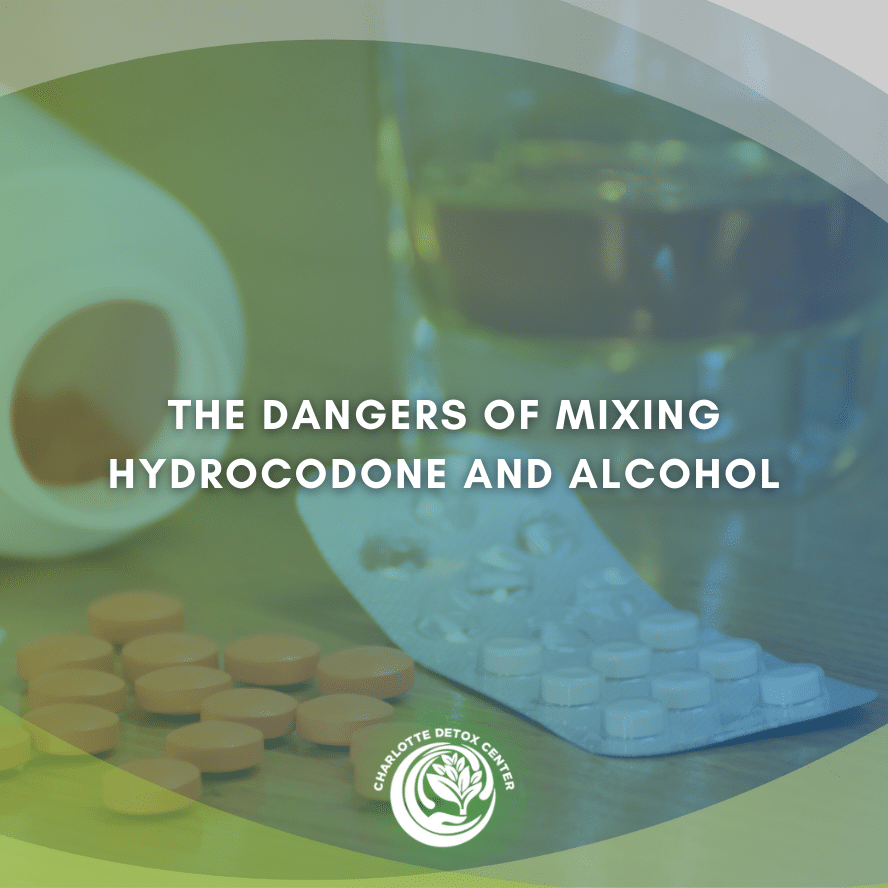The Dangers of Mixing Hydrocodone and Alcohol

Medically Verified: 2/1/24
Medical Reviewer
Chief Editor

All of the information on this page has been reviewed and verified by a certified addiction professional.
Hydrocodone is a prescription opioid medication used to treat the symptoms of moderate to severe pain. Like other opioids, it works by changing the way your brain responds to pain.[1] While this medication is extremely beneficial for individuals experiencing pain from injuries or surgeries, hydrocodone is known to be habit-forming and highly addictive.
Abusing hydrocodone is dangerous, but it is even more dangerous when people mix the drug with other substances like alcohol. Alcohol can have serious and life-altering side effects on its own, and it can increase the side effects of other drugs. Mixing hydrocodone and alcohol can increase the risk of addiction, overdose, and more.
The Effects of Hydrocodone Abuse
Hydrocodone works by binding to opioid receptors in the brain, preventing you from experiencing pain. However, this medication can also cause people to experience a euphoric and drowsy high, so many people begin abusing the drug and eventually develop an addiction.
The immediate side effects of hydrocodone include:[2]
- Blurry vision
- Confusion
- Constipation or diarrhea
- Dry mouth
- Euphoria
- Itchy skin
- Lightheadedness
- Nausea and vomiting
- Nodding in and out of consciousness
- Pinpoint pupils
- Reduced breathing rate
- Seizures
- Sleepiness or drowsiness
- Slowed heartbeat
- Slurred speech
- Warm, flushed skin
Long-term hydrocodone abuse can cause changes in the way your brain functions and affect your mood and thought patterns. Hydrocodone abuse can increase your risk of mental health issues like anxiety, depression, and even insomnia.
Additionally, when you repeatedly abuse hydrocodone your body will become tolerant of the substance which can cause you to increase your dosage to experience the high you desire. However, some individuals may begin to mix the drug with other substances, like alcohol, to create a new effect.
Is it Safe to Drink Alcohol While Taking Hydrocodone?
In general, people who are prescribed hydrocodone or another other opioid painkiller are discouraged from drinking alcohol or consuming any other psychoactive substance. Even over-the-counter medications like Tylenol or Ibuprofen can be dangerous when they are mixed with alcohol. However, if you must drink while taking hydrocodone, it’s important to limit your alcohol consumption to one drink for women and two drinks for men.
What Happens When You Mix Hydrocodone and Alcohol?
Whether you are taking hydrocodone for pain or suffer from an addiction to the drug, you should know that mixing it with alcohol is incredibly dangerous. This is because both substances are central nervous system depressants, meaning they slow down activity in your brain. When used alone, each substance can cause sedation and cognitive impairment, but when combined, these drugs can become life-threatening.
If you are prescribed hydrocodone and take it as directed, you shouldn’t experience too many intoxicating or worrisome symptoms. But if you take a higher dose than you are prescribed or you mix it with large volumes of alcohol, you may experience significant intoxication.
The common side effects of mixing alcohol and hydrocodone include:[3]
- Nausea and vomiting
- Dehydration
- Fluctuations in blood pressure
- Irregular heart rate
- Dizziness
- Loss of coordination
- Impaired judgment
- Loss of consciousness
- Abnormal behavior
- Sleepiness and fatigue
- Respiratory depression (shallow, slowed, or labored breathing)
- Coma
In addition, both alcohol and hydrocodone are addictive substances. When you routinely abuse both drugs, your risk of becoming addicted skyrockets. Combining hydrocodone and alcohol can lead to the development of a severe substance use disorder.
Symptoms of a Hydrocodone and Alcohol Overdose
When taken together, alcohol and hydrocodone intensify the effects of one another which can significantly decrease your motor skills and coordination and limit your ability to think clearly. Even further, the effects of combining these substances can lead to life-threatening emergencies like overdoses.
Mixing hydrocodone and alcohol can become deadly because they are both central nervous system (CNS) depressants. Taking multiple CNS depressants can slow your heart and breathing rate so much that you do not receive oxygen to your brain, leading to a loss of consciousness.
The symptoms of an alcohol and opioid overdose include:
- Pinpoint pupils
- Loss of consciousness
- Respiratory depression
- Coma
- Unresponsiveness
- Limp body
- Being awake but unable to speak
- Pale or clammy skin
- Blue lips, fingernails, and skin
- Slow, erratic, or unidentifiable pulse
- Choking sounds (“death rattle”)
- Nausea and vomiting
Overdosing on hydrocodone and alcohol can lead to brain damage, especially if help isn’t received quickly.
Liver Damage from Hydrocodone/Acetaminophen and Alcohol Abuse
Another danger associated with mixing alcohol and hydrocodone is related to the acetaminophen that many hydrocodone pills contain. Acetaminophen is rough on your liver, but so is alcohol. Using these two substances together can place immense stress on your liver, allowing toxins and drug byproducts to build up in your system. When you are taking large amounts of acetaminophen and drinking alcohol over a long period, you can develop liver toxicity, disease, and failure.[4]
Find Help for Hydrocodone and Alcohol Abuse Today
The dangers of mixing hydrocodone and alcohol are often life-threatening, resulting in fatal overdoses, brain damage, and even liver complications. If you or a loved one are addicted to this combination of substances, you should consider seeking professional addiction treatment. The first step in recovery from drug and alcohol addiction is attending a medical detox program.
At Charlotte Detox, we can provide you with a combination of medications and treatments that reduce your symptoms of withdrawal and allow you to overcome them safely. Additionally, we ensure that every client is comfortable by offering 24/7 psychological support and therapy.
To learn more about our drug and alcohol detox programs, contact Charlotte Detox Center today.
References:
